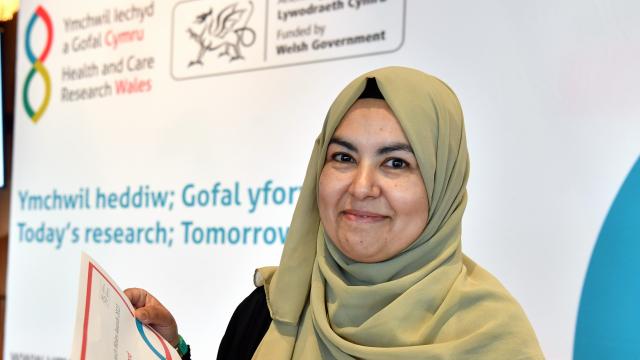
Community education programme hopes to increase ethnic minority attendance at important diabetes screening checks
10 November
To mark World Diabetes Day on 14 November 2023, researchers funded by Health and Care Research Wales will discuss a new Wales-wide community-based education programme which aims to increase attendance at diabetes follow-up checks among people from ethnic minority backgrounds.
The study, called CYMELL, which means ‘motivation’ in Welsh, is being led by researchers at Betsi Cadwaladr University Health Board and PRIME Centre Wales, funded by Health and Care Research Wales, and will be piloted with the support of five GP surgeries across Cardiff and Vale University Health Board, Swansea Bay University Health Board and Betsi Cadwaladr University Health Board.
People from ethnic minority backgrounds are up to five times more likely to develop type 2 diabetes, and often develop the condition at a younger age, representing 40 per cent of type 2 diabetes cases diagnosed before the age of 40.
This year’s World Diabetes Day aims to highlight the impact of diabetes-related complications and the importance of having access to the right information, care and treatment to manage them. People with diabetes are offered regular follow-up checks to monitor for complications. However, the uptake of these screening checks among those from ethnic minority backgrounds is low compared to the white British population. This can put them at greater risk of developing complications such as sight loss, kidney damage and nerve problems which can lead to someone requiring amputation.
Researcher Dr Ashra Khanom, from PRIME Centre Wales, said:
With the right support and management it is possible to live well with type 2 diabetes and avoid complications developing. We hope that this programme will provide evidence on how to improve the uptake of diabetes follow-on checks and support people from these communities in managing their condition.”
CYMELL will be delivered by healthcare professionals alongside third sector organisations, with easy-to-read information available in several different languages, including Urdu, Bengali, Somali and Arabic.
Thanuja Hettiarachchi is a member of the Patient and Public Involvement team that helped develop the study. Thanuja said,
 "I am thrilled to support this crucial initiative. The study team is dedicated to ensuring that the voices and needs of ethnic minority individuals are heard and integrated into healthcare practices.
"I am thrilled to support this crucial initiative. The study team is dedicated to ensuring that the voices and needs of ethnic minority individuals are heard and integrated into healthcare practices.
“My husband developed diabetes in adulthood so I have experience of supporting someone with the condition. Culturally-sensitive healthcare, fostering trust and understanding, is important to empower ethnic minority individuals with knowledge, early detection and access to the support they need.”
For more information about CYMELL visit CYMELL (primecentre.wales)